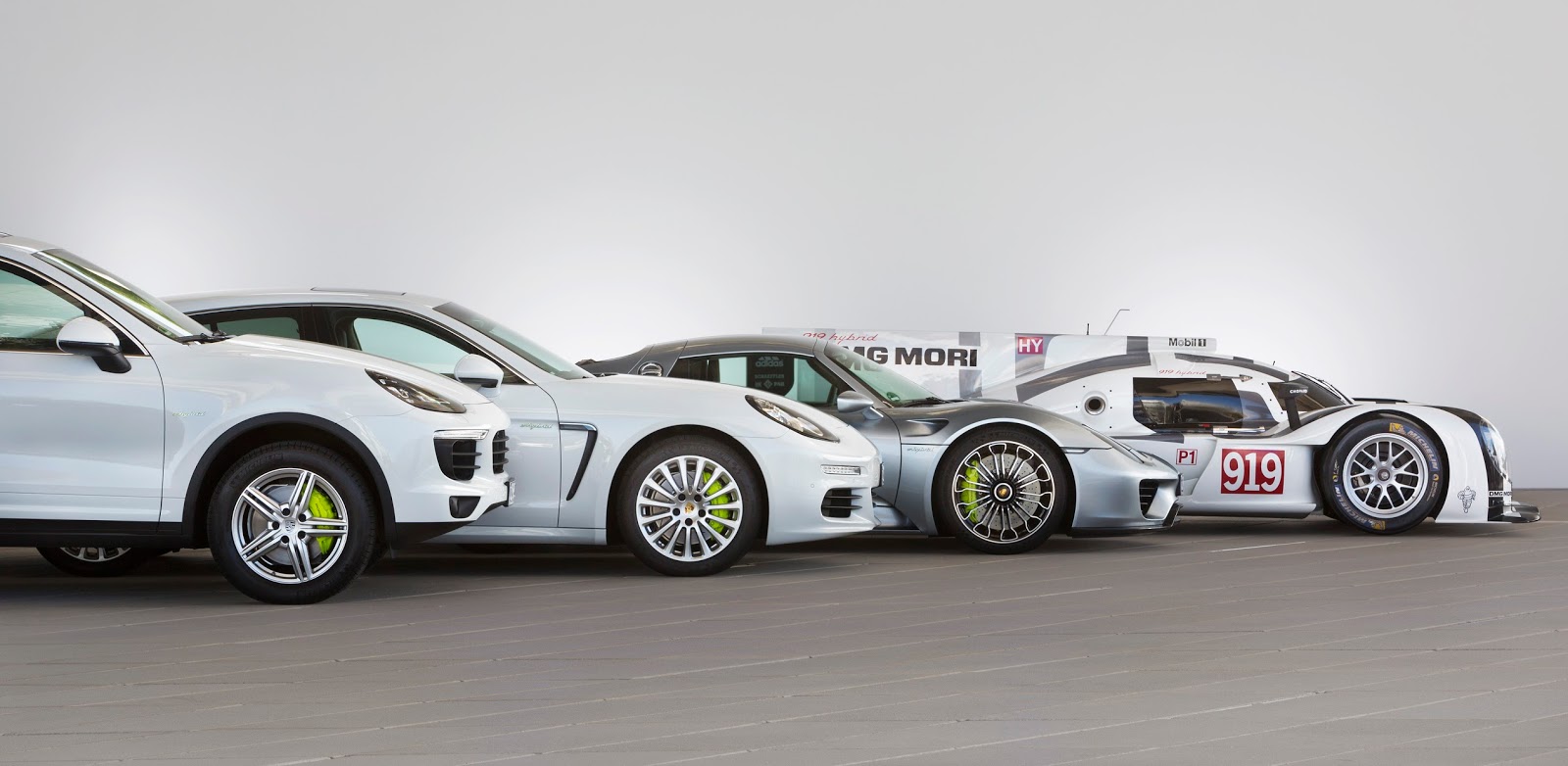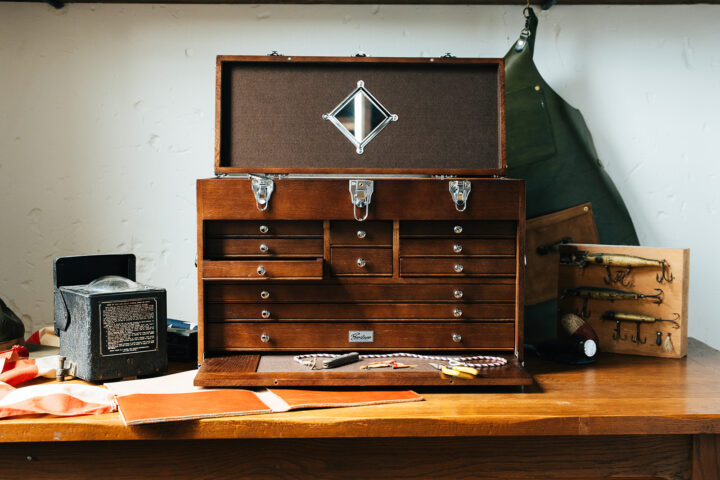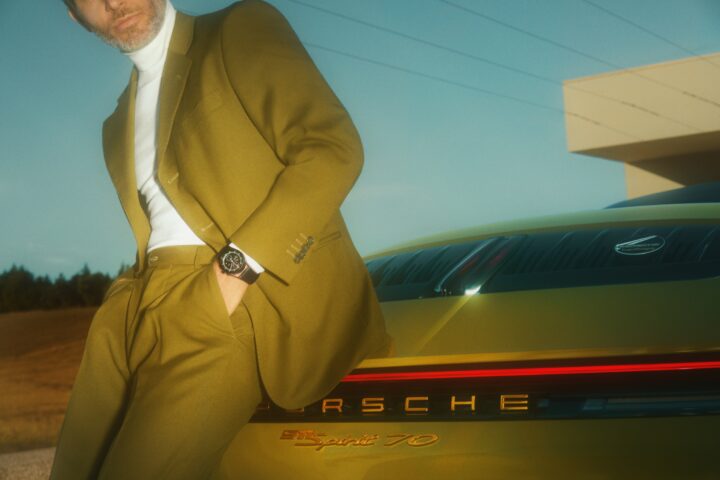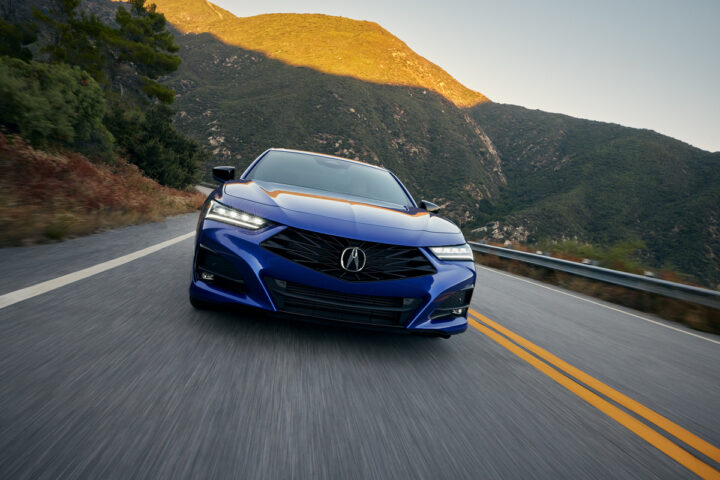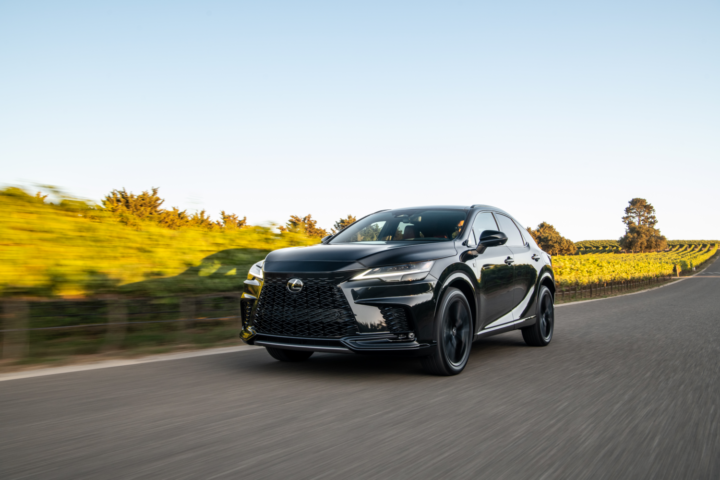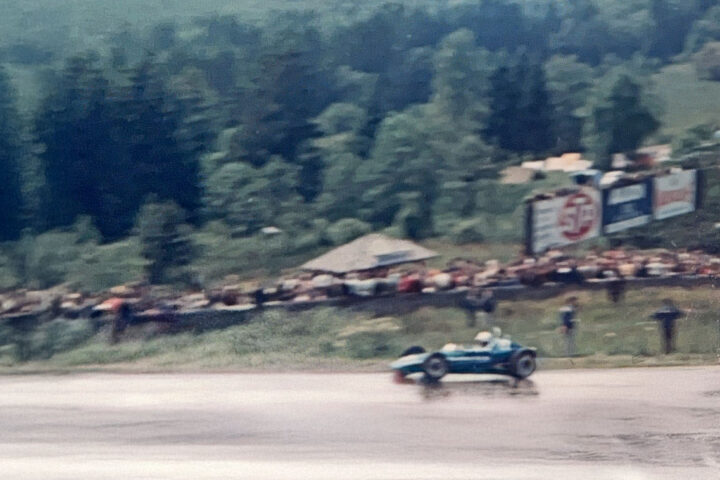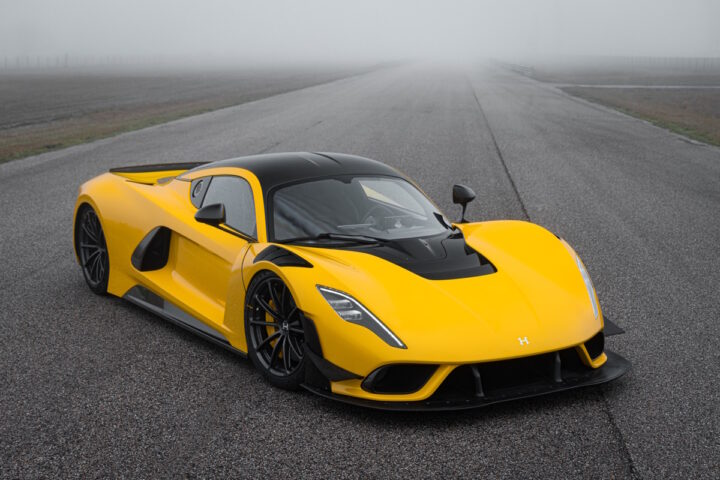The most successful manufacturer at Le Mans celebrates its latest, 17th win in Sussex
With an unrivalled record of 17 outright wins at Le Mans – the most recent scored just two weeks ago – the theme for this year’s Goodwood Festival of Speed (25 – 28 June) near Chichester, West Sussex, Flat Out and Fearless – Racing on the Edge, is a perfect fit for Porsche.
The Le Mans 24 Hours endurance motor race places high emphasis on engineering ingenuity, team skill and driver bravery, and these attributes have underpinned the high speed Porsche pace behind that tally of triumphs.
Furthermore, developing race-bred innovations that are then transferred to the road-going sports cars is a fundamental philosophy at Porsche. Sporting ambition has inspired Porsche engineers from the very beginnings of the company. The race circuit has been the merciless testing ground for the company’s sports car technology for seven decades, and examples of technology transfer from race track to road include turbocharging, PDK transmission, active aerodynamics and most recently hybrid drivetrains – which powered the team to Le Mans success in 2015.
Porsche highlights at the Festival
Underlining this ethos, Porsche will once again demonstrate an exciting array of new models alongside icons from its renowned collection. The Porsche Museum in Stuttgart is proud custodian of over 400 exhibits, and each year brings examples of its priceless treasures to Goodwood to evoke old memories and create new ones.
The Panamera S E-Hybrid and Cayenne S E-Hybrid will be participating up the hill on the Thursday in the Moving Motor Show presented by the AA in association with The Telegraph. Together with the 918 Spyder, these models underline the position of Porsche as the only premium marque with three plug-in hybrid cars in its range.
The Le Mans-winning 919 Hybrid LMP1 World Endurance Championship race car on display further emphasises the Porsche commitment to hybrid powertrain technology at the very highest level. Together with the Cayenne S E-Hybrid, Panamera S E-Hybrid and 918 Spyder hybrid super sports car, the cutting-edge drivetrains of these cars support the Festival of Speed ‘Moving Forward’ category.
Further demonstration of the Porsche commitment to technology transfer from the race track to the road is given by the 911 GT3 RS, which shares many of its technical features – including a flat-six 4.0-litre direct injection engine – with the recently unveiled 911 GT3 R race car. Furthermore, the crankshaft of the RS road car is made from the same exotic material as that used in the engine of the 919 Hybrid.
Porsche fans will also enjoy the UK debuts for the aforementioned 911 GT3 RS, Cayman GT4 and Boxster Spyder – which will all be on static display during the MMS, but in action over the Festival weekend.
Porsche will also be showcasing the 918 Spyder super sports car, produced in a limited series of just 918 examples and now sold out. In addition to being the fastest production car around the Nürburging circuit in Germany, the 918 Spyder also set a new, unique record when it ascended the Goodwood Hill in all-electric mode last year.
The Michelin Supercar Run will see the 918 Spyder, 911 GT3 RS and Cayman GT4 perform and the ‘First Glance’ will see the Boxster Spyder make its UK debut alongside the 911 Targa GTS and Cayenne Turbo S (the fastest SUV around the Nürburgring, clocking a record time of 7 m 59.74 secs).
Porsche ‘Rolling’ Museum
There are also a number of exotic classic race cars from the Porsche Museum in attendance – including the 936/81 Spyder 1981 Le Mans winner and 962 C 1987 Le Mans winner – which are helping to celebrate the career of British racing driver and Porsche legend Derek Bell MBE. Derek himself will be reunited with these iconic cars during the weekend.
Also visiting is the rare LMP1-98 Porsche WSC Spyder from the 1998 Le Mans.
These three will be demonstrated at the Festival of Speed and are joined by the static display of the 1971 Le Mans-winning MARTINI TM Racing Team Porsche 917 and the phenomenal 1,200 hp 917/30 CanAm race car.
1998 Type LMP1-98
The Porsche Type LMP1-98 of 1998 is the final development of the Porsche WSC Spyder. Joest Racing won the 24 Hours of Le Mans back-to-back in 1996 and 1997 with the WSC Spyder – a phenomenal achievement with the same chassis – but in 1998 luck evaded this distinctively-styled open-top racer.
The record of success for Porsche at the French race was upheld, however, for the new 911 GT1 ’98 crossed the finish line in first and second place that year to win the 16th Le Mans for the Stuttgart marque. The 550 hp, flat-six engined Type LMP1-98 finished second in the ten hour ‘Petit Le Mans’ race at Road Atlanta, Georgia, USA, later that year, before an honourable retirement in the Porsche Museum and a special place in history.
1987 962
Between 1982 and 1994, the Porsche 956 / 962 was synonymous with Le Mans and helped underline Porsche sports car supremacy in an arguably golden era of endurance racing. The car at Goodwood won Le Mans in 1987 driven by Derek Bell, Hans Stuck and Al Holbert, a year in which the factory Porsche team overcame challenges from Jaguar as well as many private entrants driving similar 962 chassis.
To this day, Porsche is the world’s largest manufacturer of race cars and the 956 / 962 was to all intents and purposes a race car anyone could buy – should they have had the equivalent of 650,000 Euros to hand! Porsche built 148 examples and with a powerful and efficient flat-six twin-turbo engine, the cars collected ten World Championships and seven Le Mans victories in various guises.
1981 936/81 Spyder ‘Jules’
After two victories at the 1976 and 1977 Le Mans races, the 936 Spyder had been on display at the Porsche Museum in Zuffenhausen. But when the decision was taken in 1981 to prepare a new entry for the 24 Hours that could challenge for overall honours, this meant developing a new car. However, there was too little time for a completely new design before the race date. Engineers from Weissach remembered that the earlier race-winning 936 was languishing in the Museum, and borrowed its chassis and the body! The only new element was the engine, which was derived from a unit designed for racing at the Indianapolis 500 in the US but never used there. The version for Le Mans was tuned to develop 620 hp – a flat-six, turbocharged engine, the cylinder heads are water-cooled and there are four valves per cylinder and four camshafts.
This concept led to success, and it proved to be the fastest car on the track. Jacky Ickx/Derek Bell started from pole position and went on to win Le Mans by 14 laps
1971 917 K MARTINI TM Racing Team – static display
Looking at the starting grid for the 1971 Le Mans 24 Hours, one could be forgiven for thinking that the conditions were favourable to Porsche. Out of a total of 49 participating vehicles, 33 were built in Zuffenhausen. The armada of Porsches was led by six 917 coupes – three ‘Lang Heck’ (LH) long-tail and three ‘Kurz Heck’ (KH) short-tail versions. Their rivals in the super sports car category were five Ferrari 512s.
Since its triumphant victory in 1970, the Porsche flat-twelve engine had been increased from 4.5-litres to 5.0-litres. One aerodynamic modification was most striking; the ‘shark’s fin’ on both sides of the rear bodywork. In one of these shark fin 917 KH, however, a small secret was hidden away underneath its white plastic skin; not even the driver was aware of it at first. The car with start number 22 had a new magnesium chassis frame – a material a third lighter than aluminium.
After the start, the 917 LH models led the field supremely for five hours. In the second half of the race, however, the tactics of start number 22 paid off. Gijs van Lennep and Helmut Marko had treated the ultra-light 917 entered by the MARTINI TM Racing Team gently. After many competitors had retired as victims of the extremely high speeds, this duo took over the lead in the 13th hour.
When they crossed the finishing line on Sunday at 4 pm, they had built up a two-lap lead over the John Wyer Automotive Porsche driven by Richard Attwood and Herbert Müller. The best Ferrari 512 M was third, no fewer than 31 laps behind.
1973 917/30 CanAm
Porsche used its new-found skills with forced induction to attach two exhaust-driven turbochargers to the flat-twelve engine of the 917. The result had a displacement of 5.4-litres and produced at least 1,100 hp, making it one of the most powerful racing cars ever built. Depending on the boost pressure, the engine’s power output is somewhere between 1,100 hp and 1,400 hp.
The car, which weighs a mere 800 kg, accelerates from 0 to 62 mph in just 2.4 secs, by which time the driver hasn’t even shifted into second gear! The 917/30 can reach 120 mph in 5.6 secs and passes the 180 mph in 11.3 seconds.
The 917/30 went on to dominate in the 1973 CanAm with the top four places in the final points being taken back to Stuttgart and Porsche factory driver, Mark Donohue, set a closed circuit record of 222 mph (355.85 km/h) around the Talladega Oval, Alabama. A time that still ranks as one of the fastest race laps ever.
These iconic models will share the spotlight with some contemporary Porsche stars, as the latest sports cars take to the hill in the Supercar Run and the First Glance demonstrations.
Supercar Run
918 Spyder
The Porsche 918 Spyder super sports car with plug-in hybrid drive marks the beginning of a new era. Never before has a super sports car designed for everyday use offered such an impressive range of dynamic performance combined with the fuel consumption of a compact car. With its unique spread of attributes, the super sports car – which features a 608 hp 4.6-litre V8 petrol engine with two electric motors that raise combined power to 887 hp – blends maximum driving dynamics with minimal fuel consumption.
The 918 Spyder is the fastest ever road-going Porsche. With the weight-optimised ‘Weissach’ package fitted, the 918 Spyder accelerates from zero to 60 mph in just 2.5 seconds, from zero to 124 mph in 7.2 seconds, and passes the 186 mph mark after 19.9 seconds. This extreme performance is paired with impressive parsimony; in the Weissach configuration, the total NEDC fuel consumption of the 918 Spyder amounts to 94 mpg (3.0 l/100 km). That equates to CO2 emissions of 70 g/km.
Underlining the incredible breadth of ability, the two electric motors on the front and rear axle allow the 918 Spyder to accelerate from zero to 62 mph (100 km/h) in 6.1 seconds, without producing any emissions.
Furthermore, the 918 Spyder (complete with Weissach package) currently holds the lap record for road vehicles on the Nürburgring-Nordschleife, with a time of 6:57 minutes. By taking the Nürburgring record, the 918 Spyder demonstrates the enormous potential that lies in the pioneering plug-in hybrid Porsche concept, and is underpinning the leading role the company plays in developing sporting hybrid vehicles.
The 918 Spyder has been greatly influenced by its affiliations with motorsport, and the technology transfer from track to road. A number of the developments on the Porsche 919 LMP1 were used in the 918 Spyder – and vice versa. The structural concept, based on a rolling chassis (i.e. a chassis without bodywork), is standard for Porsche race cars. The design of the V8 engine is based on that of the Le Mans Prototype 2 (LMP2) race car, the RS Spyder, and the supporting monocoque structures and unit carriers are made from carbon fibre reinforced plastic (CFRP).
Price:
Engine: € 853,155
4,593cc V8 petrol engine developing 608 hp at 8,700 rpm, plus:
115 kW (hybrid module on rear axle)
95 kW (electric motor on front axle) (equiv 286 hp)Combined power of 887 hp at 8,500 rpm; max torque of 917 – 1,280 Nm
0-62mph:
Top Speed: 2.6 secs (in electric mode: 6.2 secs)
214 mph (purely electric 93 mph)
911 GT3 RS
This latest RS is the fifth generation of the ultimate version of the 911 GT3 – the street-legal race car of the 911 range, which still offers everyday usability combined with outstanding on-track performance. It has lapped the Nürburgring in 7 min 20sec.
With four out of five owners using their cars for track days, the latest model features many innovations to reduce weight and further increase performance – including a magnesium roof and body panels made from carbon fibre that make it 10 kg lighter than the standard 911 GT3. It features 20” wheels on the front, 21” wheels on the rear.
Based on the wider 911 Turbo body, the side intakes draw air into the engine and the distinctive vents on the front wheelarches assist with the aerodynamic balance. The large rear wing helps push the car onto the road at high speed, and overall downforce is three times higher than on the GT3 – yet that car’s overall drag coefficient is maintained, a phenomenal feat.
With a power output of 500 hp, the RS is the most powerful naturally-aspirated 911 engine with direct injection. The engine has a longer stroke than the 3.8-litre engine in the GT3 and displaces 4.0-litres. It also has new con rods, pistons, camshafts, cam springs – and a new crankshaft made of same material as the crank in the 919 Hybrid LMP1 Le Mans car.
Price: £131,296
Engine: 4.0-litre, naturally-aspirated, flat-six with 500hp
0-62mph: 3.3secs
Top Speed: 193 mph
Cayman GT4
The first ever Cayman GT car, developed by the Porsche Motorsport division in Weissach. It holds a 7min 40sec lap time around the Nürburgring – making it the fastest sports car in its class. Using the same 3.8-litre flat six engine from the 911 Carrera S, the GT4 shares a number of components with the 911 GT3, including chassis and brakes. It is offered with manual transmission only.
It is the first Cayman generating active downforce levels: the front spoiler and rear wing generate pressure on the front and rear axles, providing exceptional handling and stability levels.
Price: £64,451
Engine: 3.8-litre six-cylinder with 385hp
0-62mph: 4.4secs
Top Speed: 183mph
First Glance
In the First Glance category, the Boxster Spyder, 911 Targa GTS and Cayenne Turbo S will make their first public appearance.
Boxster Spyder
The lightest and most powerful Boxster in the spirit of the original 550 Spyder of the 1950s, this latest version is powered by a 375 hp 3.8-litre flat-six engine. It has set a lap of 7m 48s around the Nürburgring. With a lightweight roof with manual operation, no air conditioning or stereo, and a smaller fuel tank, it tips the scales at just 1,315kg. It is only available with a 6-speed manual transmission.
Its distinctive design includes visual elements that recall the legendary Porsche sports and race cars. As a tribute to the 718 Spyder from the 1960s, the new Boxster Spyder has two prominent streamlined bulges that extend down along the long rear lid behind the head restraints.
The partially manually-operated, lightweight top is suitable for everyday use and evokes roadsters from the past, while the fins that stretch back to the rear lend the vehicle design its characteristic silhouette.
Price: £60,459
Engine: 3.8-litre flat-six engine, 375 hp
0-62mph: 4.5 secs
Top Speed: 180 mph
911 Targa GTS
While enthusiasts will recognise cues from the classic Targa concept, pioneered by Porsche in the late 1960s, the new 911 Targa GTS combines state-of-the-art open roof technology with the distinctive coupé appearance.
Just like the original 911 Targa model, the new model features a characteristic wide bar in place of the B-pillars aft of the doors, a removable roof section above the driver and passenger, and a wrap-around rear window — with no C-pillar. But, unlike the classic models, the roof segment of the new Targa can be opened and closed automatically at the push of a button, in just 19 seconds.
Like all 911 Targa models, the new GTS features Porsche Traction Management all-wheel drive and thus presents itself as a high performance, innovative reinterpretation of the classic first edition from 1965. The GTS adds a tuned 430 hp engine with new cylinder heads and uprated air intake systems, producing 30 hp more than standard Carrera S models. A sports exhaust brings added emotional appeal. Key exterior styling cues include black-finished centre-lock alloy wheels, the air intake grille on the engine lid features bespoke black trim strips and the headlights have a dark tint.
Price: £104,385
Engine: 3.8-litre flat-six engine, 430 hp
0-62mph: 4.3 secs
Top Speed: 186 mph
Cayenne Turbo S
The new Cayenne Turbo S can lap the Nürburgring in 7:59.74 minutes. This sets a new record in the SUV class here, and also proves that every Porsche is a genuine sports car – even in this vehicle segment. A re-engineered 4.8-litre V8 bi-turbo engine and a chassis that is tuned for maximum driving dynamics makes the Cayenne Turbo S a genuine top athlete.
The more spontaneous response of the bi-turbo engine is primarily a benefit of the integral turbochargers, which are now housed directly in the exhaust manifolds. This new approach also improves combustion, as well as boosting power to 570 hp.
Standard Porsche Composite Ceramic Brakes (PCCB) include 420 mm diameter front brake discs and, for the first time, ten-piston callipers.
Price: £118,455
Engine: 4.8-litre V8 twin-turbo engine, 570 hp
0-62mph: 4.1 secs
Top Speed: 176 mph
Dynamic Cayenne demonstrations at the Porsche Experience Centre Goodwood
The driver-oriented chassis of the Porsche Cayenne has been designed to combine sports car handling on the road with the added versatility of being able to cover ground quickly, regardless of the terrain.
Visitors to the Festival of Speed will be able to experience Porsche power personally courtesy of Driving Consultants from the Porsche Experience Centre at Silverstone, who will be demonstrating the performance and handling of the Cayenne on a specially designed dynamics course laid out in the Porsche Experience area at Goodwood. The grass-surfaced course around which the 420 hp V6 twin-turbocharged Cayenne S models will power is intended to demonstrate perfectly the outstanding dynamic ability of this immensely versatile Porsche.
The Porsche Experience Centre Goodwood also presents the current model range, and is based to the right of the Hill on the outside of Molcombe Corner.
Look out for Porsche personalities and relax at the Café Le Mans
Porsche enthusiasts visiting Goodwood will be pleased to learn that there are many more examples of the marque, and former factory race drivers, participating in the Festival of Speed. Not least amongst these will be Richard Attwood, former F1 driver and 1970 Le Mans winner, who will be taking time out of his daily schedule as a Porsche Driving Consultant, at the Porsche Experience Centre Silverstone, to soak up the atmosphere and chat with fans.
For visitors wishing to refuel themselves, the Porsche Café Le Mans will be once more situated on the outside of the track near the footbridge, offering meals and refreshments throughout the weekend.
Follow all the Goodwood action on-line
Porsche Live, in its second year at Goodwood, is the portal to the latest news, pictures and films, combining exclusive stories from Porsche and highlights from social media – whether you are at the event or at home.
Using the hashtag #porschelive, all related content on social media will be curated by the Porsche team and the best submissions will be posted across the Porsche social media space – porsche.co.uk, a web app and also the large outdoor screens on the Porsche Experience Centre stand at Goodwood.
The Porsche Experience Centre also has two innovative activities for visitors. The first is a Cayman GT4-inspired ‘graffiti wall’ which encourages people to share their creative chalk pen designs on Twitter and Instagram incorporating the hashtag #porschelive within the post text. Prizes are drawn at random daily, and four winners will receive a Cayman GT4 driving experience at the Porsche Experience Centre Silverstone later this year.
The second competition is a ‘Build Your Ultimate 911’ configurator-based competition, using special tablets located on the Experience Centre stand at Goodwood featuring the new Porsche on-line configurator. One winner will receive a 911 driving experience at the Porsche Experience Centre Silverstone.

